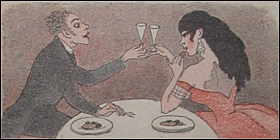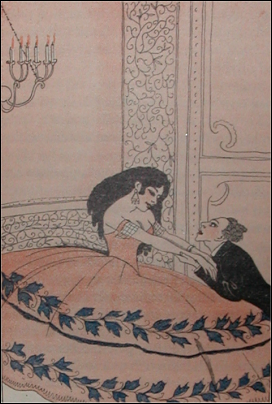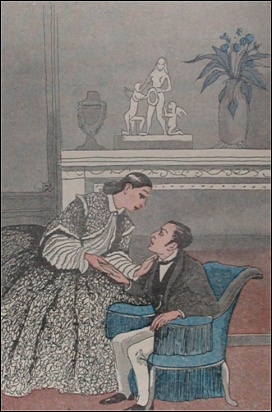The weather was black as the grave, and the wind, rocking together masses of clouds, from their joltings drew down a shower of rain and hail.
A great tempest shook the attics, and made the steeples moan; the gutter, that funereal bed which swallows up the love letters and orgies of last night, foamingly swept along its thousand secrets to the sewers: mortality swooped joyously down on the hospitals, and the Chattertons and Savages of the Rue Saint-Jacques clenched their frozen fingers over their writing decks, when the most false, the most greedy, the most sensual, the most witty of our friends sat down before a fine supper and a good table in the company of one of the most beautiful women ever fashioned by nature for the pleasure of the eyes. Samuel wanted to open the window to cast a conqueror’s glance over the accursed town; then lowering his gaze to the various felicities which he had beside him, he hastened to enjoy them.
In the company of such things he had to be eloquent; so despite his too high brow, his hair like a virgin forest and his snuff-taker’s nose, Fanfarlo found that he was almost right.
Samuel and Fanfarlo had exactly the same ideas about cooking and the diet necessary to creatures of the élite. Silly meats, insipid fish were excluded from the suppers of this siren.
Champagne rarely dishonoured her table. The most celebrated and most perfumed Bordeaux yielded place to the heavy serried battalion of the Burgundies, the wines of Auvergne, of Anjou and the south, and of the foreign wines, German, Greek, Spanish. Samuel was accustomed to say that a glass of real wine should resemble a bunch of black grapes, and that in it there was as much meat as drink. Fanfarlo loved bleeding meats, and wines laden with intoxication. However, she never got drunk. Both professed a sincere and profound esteem for the truffle. The truffle, that secret and mysterious vegetation of Cybele’s, that savoury malady which she has hidden in her entrails longer than the most precious metal, that exquisite matter which defies the science of the agronomist, as did gold that of the Paracelsuses; the truffle which marks the distinction between the old and the modern world, and which, before a glass of Chian, produces the effect of several zeros after a figure.
As to the question of sauces, ragouts, and seasonings, a grave question which would demand a chapter as grave as a scientific paper, I can assure you that they were in perfect agreement, especially upon the necessity of calling in the whole pharmacy of nature to the aid of the kitchen. Pimentos, English powders, saffrons, colonial substances, exotic dusts, all would have seemed good to them, nay, even musk and incense.
Were Cleopatra alive now, I am certain she would have liked to do up fillets of steak or roebuck with Arabian perfumes. It is certainly deplorable that the cordons bleus of to-day are not constrained by a special law to know the chemical properties of matter, and are incapable of discovering, for special cases, like that of an amorous banquet, almost inflammable culinary ingredients swift to invade the organic system, like prussic acid, or to volatilize, like ether.
Curiously enough, this harmony of opinions on the question of good living, this similitude of tastes, formed a strong bond of union; that profound understanding of sensual life which shone in every one of

Samuel’s looks and words, struck Fanfarlo very forcibly. That speech, now brutal as a numeral, now delicate and perfumed as a flower or a sachet, that strange conversation, the secret of which was known to him alone, completely won for him the good graces of this charming lady. Besides, it was not without deep and lively satisfaction that he recognized, on inspecting the bedroom, a perfect confraternity of taste and sentiments in the matter of furniture and interior arrangements. Cramer hated profoundly, and in my opinion he was perfectly right, the straight line in apartments, and the introduction of architecture into the house. The huge rooms of old châteaux terrify me, and I pity the châtelaines for having been forced to make love in great dormitories which looked like cemeteries, in huge catafalques calling themselves beds, or great monuments which used to assume the pseudonym of arm-chairs. The apartments of Pompeii are the size of your hand; the Indian ruins that cover the coast of Malabar reveal the same system. Those great, voluptuous and wise races understood the question perfectly. The intimate sentiments can only be evoked in a very narrow space.
Fanfarlo’s bedroom, then, was very little, very low, cluttered up with soft things, perfumed and dangerous to touch; the air, laden with queer miasmas, made one want to expire slowly as if in a hot-house. The light of the lamp played on a confusion of laces and stuffs of a violent but equivocal hue. Here and there, on the wall, it lit up a few paintings full of Spanish voluptuousness; very white flesh-tints against very dark backgrounds. It was in the depths of this delightful hovel, which smacked at once of the bagnio and the sanctuary, that Samuel saw, advancing towards him, the new goddess of his heart in the radiant and sacred splendour of her nudity.
Where is the man who, even at the cost of half a lifetime, would not wish to see his dream, his real dream, pose unveiled before him, and the adored phantom of his imagination drop, one by one, the garments designed as a protection against the vulgar gaze? But here was Samuel, seized by a queer caprice, beginning to shout like a spoiled child: ‘I want Columbine. Give me back Columbine! Give her back to me as she appeared to me the evening she made me mad with her fantastic trappings and her mountebank’s corsage!’

Fanfarlo, at first astonished, was quite willing to lend herself to the eccentricity of the man she had chosen, and Flore was summoned; it was no use the latter representing that it was three o’clock in the morning, that everything was locked up at the theatre, the concierge asleep, the weather frightful—the storm was still raging; she who herself obeyed, had to be obeyed, and the chambermaid went out. Suddenly Cramer, seized with a new idea, clung to the bell-pull, and shouted in a voice of thunder:
‘Hey, don’t forget the rouge!’
This characteristic trait, which was related by Fanfarlo herself one evening when her comrades were asking her about the beginning of her liaison with Samuel, in no way astonished me; I well recognized in this the author of the Ospreys. He will always love rouge and ceruse, chrysocolla and tinsel of every sort. He would be quite prepared to repaint the trees and the sky, and if God had entrusted him with the plan of nature, perhaps he would have spoiled it.
Though Samuel had a depraved imagination, and perhaps for that very reason, love was with him less an affair of the senses than of the reason. It was, above all, admiration and appetite for beauty; reproduction he regarded as a vice of love, pregnancy a spiderish disease. Somewhere he has written: ‘Angels are hermaphroditic and sterile’. He loved a human body like a material harmony, like a fine piece of architecture plus movement; and this absolute materialism was not far removed from the purest idealism. But, as in beauty, which is the cause of love, there were, according to him, two elements: line and appeal — and because all this concerns only line — the appeal for him, at least that evening, was rouge.
So Fanfarlo summed up for him line and appeal: and when, seated on the edge of the bed, in the care- free, victorious tranquillity of the loved woman, her hands delicately resting upon him, Samuel looked at her, it seemed to him that he saw the infinite behind the bright eyes of this beauty, and that gradually his own looked down on immense horizons. Besides, as often happens with exceptional men, he was often alone in his paradise, none being able to inhabit it with him. And if, by chance, he ravished and dragged her thither almost by force, she always lagged behind; consequently in the heaven where it held sway, his love began to be sick and sad of an azure melancholy like a solitary king. However, he never got tired of her; never, on leaving his amorous retreat, walking briskly on a pavement in the fresh morning air, did he experience that selfish cigar and hands-in-pocket enjoyment of which our great novelist somewhere speaks.
If he had no heart, Samuel had a noble intelligence and, instead of gratitude, enjoyment had engendered in him that luscious contentment, that sensual dreaminess which is perhaps better than love as the vulgar understand it. Besides, Fanfarlo had done her best and dispensed her most cunning caresses, having observed that the man was worth the trouble: she had grown accustomed to that mystic language variegated with impurities and enormous crudities. That had for her at least the attraction of novelty.

The dancer’s escapade had made its scandal. There were several ‘no performances’ on the bill; she had neglected rehearsals; many people envied Samuel.
One evening when chance, M. de Cosmelly’s ennui, or some complicated manouvre of his wife’s, had brought them together at the fireside; after one of those long silences which occur in household where husband and wife have nothing more to say to each other, or a great deal to conceal; after having made him the best possible tea in a very modest and very cracked teapot, perhaps still the one from her aunt’s château; after having sung at the piano a few selections from music in vogue ten years ago; she said to him, with the sweet and prudent voice of virtue anxious to be amiable and afraid of scaring the object of its affections, that she pitied him very much, that she cried a lot, more about him than about herself; that she would have liked at least, in her very submissive and devoted resignation, that he might have found elsewhere than with her the love which he no longer wanted from his wife; that she had suffered more at seeing him deceived than at being herself abandoned; that, besides, she was very much to blame, that she had forgotten her tender, wifely duties in not warning her husband of the danger; that, besides, she was quite ready to close that bleeding wound, and by herself alone to repair an imprudence committed by both, etc., and all the honeyed words suggested by a cunning authorized by love. She wept, and wept well: the fire lit up her tears and a face beautified by sorrow.
M. de Cosmelly did not say a word and went out. Men caught in the snare of their faults dislike making an offering of their remorse to clemency. If he went to Fanfarlo’s he would doubtless find traces of disorder, cigar ends, and newspapers.
One morning Samuel was awakened by the roguish voice of Fanfarlo, and slowly raised his tired head from the pillow where it was resting to read a letter which she handed to him.
‘Thanks, monsieur, a thousand thanks; my happiness and gratitude will be noted to your credit in a better world. I accept. I am taking back my husband from your hands and am carrying him off this evening to our estate at C—, where I am going to recover the health and the life I owe to you. Receive, monsieur, the promise of an eternal friendship. I have always believed you to be too fine a man not to prefer one more friendship to any other reward.’
Samuel, wallowing in lace, and leaning over one of the coolest and most beautiful shoulders it is possible to see, felt vaguely that he was tricked, and had some difficulty in marshalling in his memory the elements of the plot, the dénouement of which he had brought about; but he said to himself quietly:
‘Are our passions really sincere? Who can know with certainty what he wants, and know exactly the barometer of his heart?’
‘What’s that you’re muttering? What is it? I want to see,’ said Fanfarlo.
‘Oh, nothing,’ said Samuel. ‘A letter from a nice woman to whom I promised that I’d make you love me.’
‘I’ll make you pay for that,’ she hissed.
It is probable that Fanfarlo loved Samuel, but with that love known to so few souls, with spite at the bottom of it. As for him, he had been punished where he sinned. He had so often aped passion, he was forced to know it; but it was not the tranquil, calm and strong love that decent girls inspire, it was the terrible, desolating and shameful love, the sickly love of the courtesan. Samuel knew all the tortures of jealousy, and the degradation and sadness into which we are cast by the consciousness of an incurable, constitutional malady; in short, all the horrors of that vicious marriage which is called concubinage. As for her, she is getting stouter every day; she has become a plump, fresh, shining, and artful beauty, a sort of ministerial tart. One of these days she will take the Easter Communion and will hand out the consecrated bread to the parish. At that period perhaps, Samuel, killed by hard labour, will be nailed down by the planks, as he used to say in the good old days, and Fanfarlo, looking like a canoness, will turn the head of some young heir. Meantime she is learning how to have children; she has just been happily delivered of twins. Samuel has given birth to four learned books: a book on the four evangelists, another on the symbolism of colours, a memoir on a new advertising system, and a fourth, the title of which I do not wish to remember. The most frightful thing about the last one is that it is full of verve, energy, and curiosities. Samuel had the nerve to give it the epigraph: Auri sacra fames! Fanfarlo wants her husband to get into the Academy, and she is intriguing at the Ministry to procure him the cross.
Poor singer of the
Ospreys! Poor Manuela de Monteverde! He has fallen very low. I recently learned that he was founding a socialist newspaper, trying to enter politics. Intellectually dishonest! to quote that honest man, M. Nisard.

